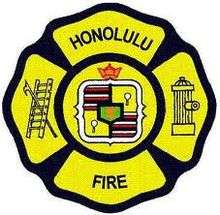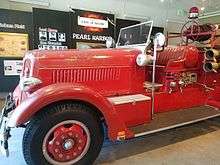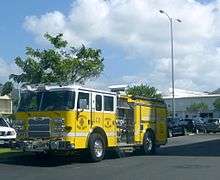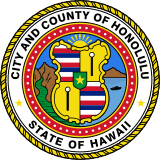Honolulu Fire Department
 | |
| "Pride, Service, Dedication" | |
| Operational area | |
|---|---|
| Country |
|
| State |
|
| County |
|
| Agency overview[1] | |
| Established | December 27, 1850 |
| Employees | 1,100 |
| Staffing | Career |
| Fire chief | Manuel P. Neves |
| IAFF | 1463 |
| Facilities and equipment[1] | |
| Battalions | 5 |
| Stations | 45 |
| Engines | 43 |
| Tillers | 5 |
| Platforms | 2 |
| Quints | 8 |
| Rescues | 2 |
| HAZMAT | 2 |
| Airport crash | 2 |
| Helicopters | 2 |
| Fireboats | 1 |
| Website | |
| Official website | |
| IAFF Website | |
The Honolulu Fire Department (HFD) provides fire protection and first responder emergency medical services to the City & County of Honolulu, Hawaii, United States, under the jurisdiction of the Mayor of Honolulu. Founded on December 27, 1850 by Kamehameha III and Alexander Cartwright, the Honolulu Fire Department serves and protects the entire island of O'ahu, covering over 600 square miles (1,600 km2) of territory, home to more than 880,000 residents and over 4 million annual visitors.[2]
The HFD is one of just a handful of fire departments in the nation that is Nationally accredited.[3] The Commission on Fire Accreditation International (CFAI) confers Accredited Agency status for a period of five years.
History
In the early 1800s, with an influx of missionaries, whalers, and businessmen to Hawai'i, Honolulu grew rapidly with western-style wooden buildings, which were highly combustible. Interior lighting in that period consisted of all flame-emitting equipment (candles, lamps, and lanterns); therefore fires became common in homes and businesses.[4] On October 24, 1850, a public assembly raised the concern of the people to have adequate fire protection; and an outcome of this meeting was the formation of Honolulu's first Volunteer Fire Brigade, on November 6, 1850.[5] The HFD holds the distinction of being the first fire department in all of the Hawaiian Islands.[6]

Establishment of the HFD
On December 27, 1850, an ordinance issued by Kamehameha III established the Honolulu Fire Department.[5] On February 3, 1851, Oahu Governor Kekuanaoa appointed Alexander Joy Cartwright Jr. to be Chief Engineer of the Fire Department of the City of Honolulu, making him the first Fire Engineer of the newly formed Department.[7] The ordinance was enacted into law by the Hawaiian Legislature of 1851 (S.S. 1851, pp. 5-ll), becoming effective on May 8, 1851, after it was signed by the Speaker of the House of Representatives, William L. Lee, and King Kamehameha.[5]
The HFD is also the only fire department in the United States that was established by the order of the King of a Monarchy; and the department was continued by a Provisional Government, then a Republic, then a Territory, a County and lastly by a City and County Government.[5] Honolulu, which was the Capital of the Territory of Hawaii, is believed to be the only fire department in the world that has had kings serve as active members with King Kamehameha III, who reigned during the 1850s and King David Kalakaua, during the 1880s working alongside volunteers.[5]
Hawaiian Engine Company No. 4

King Kalākaua was a member of Engine Company No. 4, which was originally an all-Hawaiian Company established in 1861. Prince Albert Kamehameha, a toddler at the time, admired Company 4 and was made an honorary member.[4] After his death at the age of five, the entire HFD joined his funeral procession. When King Kalākaua died in 1891, firefighters draped black fabric on their stations to show their respect for the King.[7]
Chinatown Fire of 1886
On April 18, 1886, a fire started in a building at Hotel and Smith streets and destroyed over 60 acres of buildings and involved a loss surpassing $1,453,000. Buildings had been constructed close together, allowing the fire to quickly spread in all directions.[5] In response, on April 20, 1886, the Board of Fire Underwriters was formed. On May 29, 1886 King Kalākaua signed Honolulu’s first building laws (building codes).[7]
Chinatown Fire of 1900
In an effort to control the bubonic plague, blocks of buildings were burnt, one at a time. On April 20, 1900, the block next to Kaumakapili Church was set on fire. As the flame grew, the wind unexpectedly changed; and the fire spread to the steeple of the church and then began to spread quickly across the City. Firefighters worked hard to control the fire that swept Chinatown, burning 38 acres. The property losses totaled over $3,000,000.[7]

Fire Museum
The Honolulu Fire Museum and Education Center is located in the former historic Kakaʻako Fire Station, built in 1928, and neighbors the HFD headquarters’ building, which was completed in 2006. The Engine Company occupied Kakaʻako Station on October 1, 1929, and the Ladder Truck Company moved in March 1, 1930. The Shop opened in 1931.[7] Kaka’ako Fire Station was one of several HFD stations that were nominated to the National Register of Historic Places in 1980.
The museum shares the history of the HFD, the history of fire-fighting apparatus and gear, and HFD's role on December 7, 1941 when Pearl Harbor was attacked. Three HFD members were killed in action while fighting fires at Hickam Field on December 7, 1941.[7] The first of three responding HFD companies arrived to find Hickam’s fire station hit by bombs. Honolulu firefighters worked tirelessly to extinguish flames and save as many US planes as possible, but a second wave of Zero fighter aircraft approached. Hoseman Harry Tuck Lee Pang was shot and killed; Captains Thomas Macy and John Carreira died in a bomb blast. Six other firefighters were injured. The Fire Department lists among its members nine men who were awarded the Order of the Purple Heart. This honor is usually only awarded to members of the Armed Forces wounded in battle.[5][7]
The Honolulu Fire Museum and Education Center is open to the public one Saturday a month for free, guided tours. Go to their website to reserve a spot on the tour.

Bureaus
Under the Fire Commission, Fire Chief, and Deputy Chief, there are three bureaus that support the fire suppression forces (Fire Operations):
- Administrative Services Bureau
- Planning and Development
- Support Services
Fire Operations Bureau
Fire Operations accounts for the majority of the activity in the HFD. They are responsible for emergency response for the island of Oahu and respond to fires, emergency medical calls, hazardous materials incidents, motor vehicle accidents, natural disasters, and also perform technical rescues.

Stations & Apparatus

Below is a complete listing of all Honolulu Fire Department fire station and apparatus locations according to Battalion.
| Neighborhood | Engine | Truck | Command | Special | |
|---|---|---|---|---|---|
| 1 | Downtown | Engine 1 | Battalion 1 | ||
| 2 | Pawaa | Engine 2 | Ladder 2 | Rescue 1, SAR Boat 1 | |
| 3 | Makiki | Engine 3 | |||
| 4 | Kuakini | Engine 4 | Ladder 4 | ||
| 5 | Kaimuki | Engine 5 | Ladder 5 | ||
| 6 | Kalihi | Engine 6 | |||
| 7 | Waikiki | Engine 7 | Ladder 7 | Battalion 2 | |
| 8 | Mokulele | Engine 8 | Mobile Command Center 1 | ||
| 9 | Kakaako | Engine 9 | Tower 9 | ||
| 10 | Aiea | Engine 10 | |||
| 11 | Sunset Beach | Engine 11 | |||
| 12 | Waipahu | Engine 12 | Quint 12 | Tanker 12 | |
| 13 | Kahuku | Engine 13 | |||
| 14 | Haleiwa | Engine 14 | Boat 14 | ||
| 15 | Hauʻula | Engine 15 | Tanker 15 | ||
| 16 | Wahiawa | Engine 16 | Tanker 16 | ||
| 17 | Kaneohe | Engine 17 | Quint 17 | Battalion 3 | Boat 17 |
| 18 | Kailua | Engine 18 | Quint 18 | Boat 18 | |
| 19 | Aikahi | Engine 19 | |||
| 20 | Pearl City | Engine 20 | |||
| 21 | Kaʻaʻawa | Engine 21 | Boat 21 | ||
| 22 | Manoa | Engine 22 | |||
| 23 | Wailupe | Engine 23 | |||
| 24 | ʻEwa Beach | Engine 24 | Boat 24 | ||
| 25 | Nu‘uanu Pali | Engine 25 | |||
| 26 | Waianae | Engine 26 | Quint 26 | Tanker 26, Boat 26 | |
| 27 | Waimānalo | Engine 27 | |||
| 28 | Nānākuli | Engine 28 | Tanker 28 | ||
| 29 | McCully | Engine 29 | Ladder 29 | Tanker 229 | |
| 30 | Moanalua | Engine 30 | Quint 30 | Tender 30 | |
| 31 | Kalihi Kai | Engine 31 | Quint 31 | Boat 31, Communications Vehicle 1 | |
| 32 | Kalihi Uka | Engine 32 | Haz-Mat. 1 | ||
| 33 | Palolo | Engine 33 | |||
| 34 | Hawaii Kai | Engine 34 | Quint 34 | Boat 34 | |
| 35 | Makakilo | Engine 35 | |||
| 36 | Mililani | Engine 36 | |||
| 37 | Kahaluu | Engine 37 | |||
| 38 | Waiau | Engine 38 | Quint 38 | ||
| 39 | Olomana | Engine 39 | |||
| 40 | Kapolei | Engine 40 | Tower 40 | Battalion 4 | Haz-Mat. 2, Boat 40 |
| 41 | Mililani Mauka | Engine 41 | Rescue 2 | Battalion 5 | SAR Boat 2 |
| 42 | Waikele | Engine 42 | |||
| 43 | East Kapolei | Engine 43 | Brush 43 | ||
| Honolulu Harbor | Fireboat "Moku Ahi" | ||||
| Honolulu International Airport | Air-1 |
Administrative Services Bureau
- Mechanic Shop: provides maintenance to fire apparatus, as well as police vehicles.[8]
- Safety & Health: administers health related programs.
Planning and Development
- Fire Communication Center: this is the vital link between the public and fire suppression forces.[4]
- Radio Shop: provides maintenance to radios and communication systems.
Support Services
Support Services manages and coordinates the Training and Research Bureau and the Fire Prevention Bureau, which also includes the Community Relations/Education section.
Training and Research Bureau
HFD accomplishes its mission largely by maintaining a well-equipped and highly trained, professional workforce of firefighters and rescue personnel.[8] The Training and Research Bureau (TRB) conducts training for all phases of firefighting, emergency medical incidents, hazardous materials incidents, technical rescues, and professional development. TRB is located at the Charles H. Thurston Training Center in Honolulu.[4]
Fire Prevention Bureau
The Fire Prevention Bureau (FPB) administers the fire prevention program for the City and County of Honolulu, which includes setting policies and procedures in the enforcement of fire codes and conducting fire investigations to determine the origin and cause of fires.[8] The FPB conducts investigations as mandated by Chapter 132-4, Hawaii Revised Statutes, and has several sections:
- Administration: Issues permits and licenses.
- Code Enforcement: enforces fire codes and regulations for occupancies within the City and County.
- Plans Examining: reviews and approves building plans to ensure compliance with building codes and conduct investigations for permits.
- Support: responsible for testing of building fire protection systems.
- Fire Investigation: determines the origin, cause and circumstances of structure fires.
- Fire Education: develops and implements programs to help minimize injuries and fire losses and to reduce the dangers to first responders.
Community Relations
Community Relations/Education (CRO) is the liaison between the community and the HFD, and it coordinates ceremonies, funerals, and other events. CRO develops, coordinates, and administers fire safety and education programs promoting fire prevention and other public safety education programs. CRO manages the museum and offers fire safety classes. Class topics range from general fire safety prevention and preparedness tips, use of a fire extinguisher, understanding the common causes of fire, how to prevent fires, and what to do in case of a fire.[8] CRO also participates in numerous fire safety education community events.
A publication the HFD produces annually is the Fire Fighter’s Safety Guide (FFSG). The FFSG is now going on about 30 years since its first publication and about 100,000 copies are now distributed island wide to all schools. Students in grades pre-K through 6th grade receive them for free.
Legal Resources
The City Charter of the City and County of Honolulu designates the HFD as the fire protection agency for the City. The HFD’s responsibilities are to provide firefighting, rescue, emergency medical, and hazardous materials response for the entire island of Oahu.
The State Fire Code, as adopted by the State of Hawaii on August 15, 2014, pursuant to Chapter 132 of the Hawaii Revised Statutes (HRS), which adopts with modifications, the 2012 National Fire Protection Association (NFPA) 1 Fire Code, published and copyrighted by the NFPA, is amended and titled "Fire Code of the City and County of Honolulu".[9]
The following HRS, originating from the State Fire Council, support the establishment of a fire department:
- Fire Protection within the State of Hawaii: HRS 132
- Reduced Ignition Propensity Cigarettes Law: HRS 132C
- Fireworks: HFD 132D
References
- 1 2 "About HFD". Honolulu Fire Department. Retrieved 7 February 2015.
- ↑ "About Honolulu". City & County of Honolulu. Retrieved 22 February 2015.
- ↑ Yamamoto, Glenn, Dan Boylan, Ken Silva, and Atilio Leonardi. [HFD Fire Chief]. 2005.
- 1 2 3 4 Honolulu (Hawaii). Honolulu Fire Department: Pride, Service, Dedication : 150 Years of Service. [Honolulu]: [Honolulu Fire Dept.], 2001.
- 1 2 3 4 5 6 7 Smith, H. A. History of the Honolulu Fire Dept. Honolulu: [Fire Dept.], 1950.
- ↑ "Firefighting in the U.S.". Fire Science. Retrieved 7 February 2015.
- 1 2 3 4 5 6 7 Honolulu Fire Museum and Education Center. Various Exhibitions: [Fire Dept.], 2016.
- 1 2 3 4 Honolulu (Hawaii). Honolulu Fire Department 2012 : the heart of HFD is our people/Honolulu Fire Department. [Honolulu]: [Honolulu Fire Dept.], 2012.
- ↑ Honolulu (Hawaii). Rules & Regulations Governing the Honolulu Fire Department, City and County of Honolulu. [Honolulu, Hawaii]: The Dept, 1996.
External links
Island Fire Departments
Federal Fire Service
- Federal Fire Fighters of Hawaii, Local F263
Child Safety
Senior Citizens
"Fire Safety for Older Adults" (U.S. Fire Administration)
Persons with Disabilities
"Fire Safety for People with Disabilities" (U.S. Fire Administration)
Residential Fire Sprinklers
Smoke Alarms
"Smoke Alarms" (U.S. Fire Administration)
